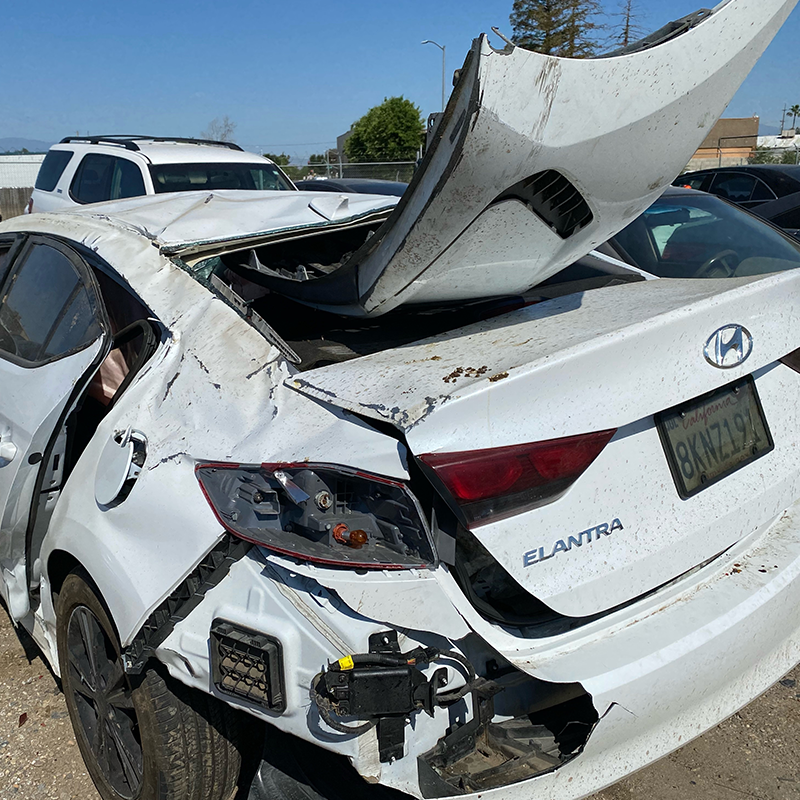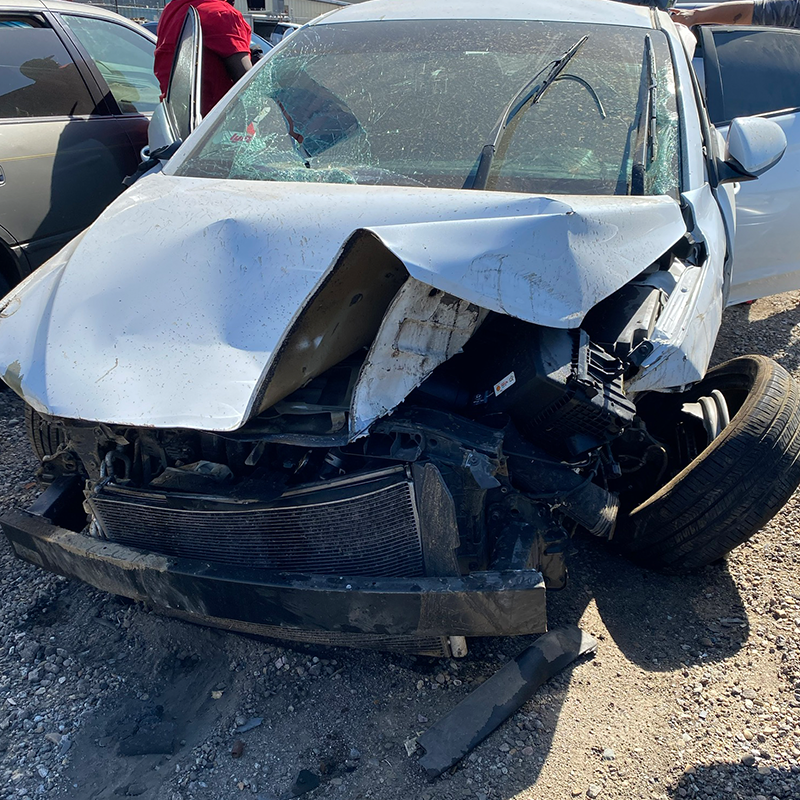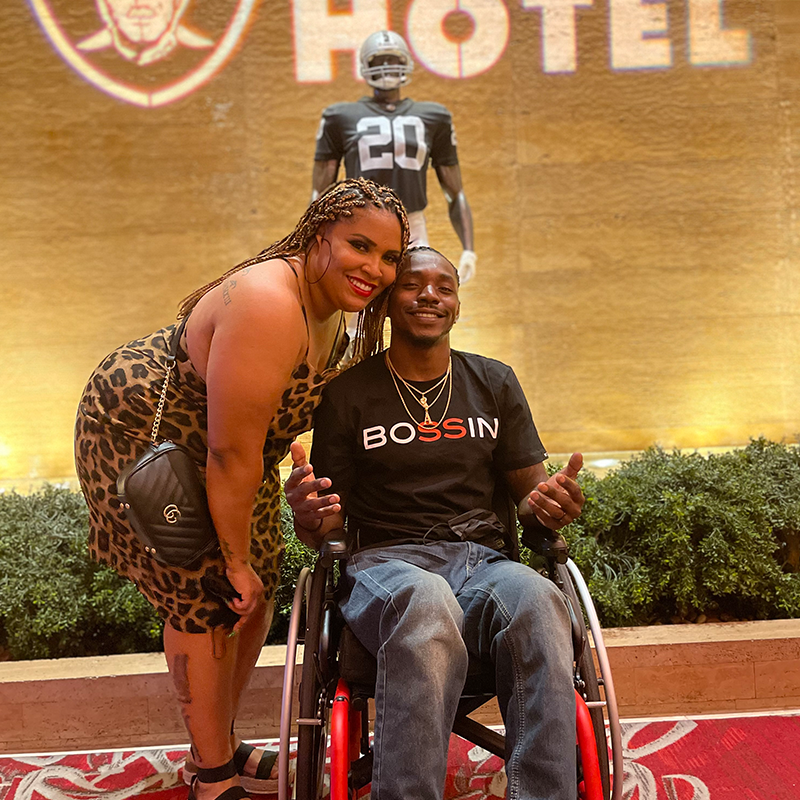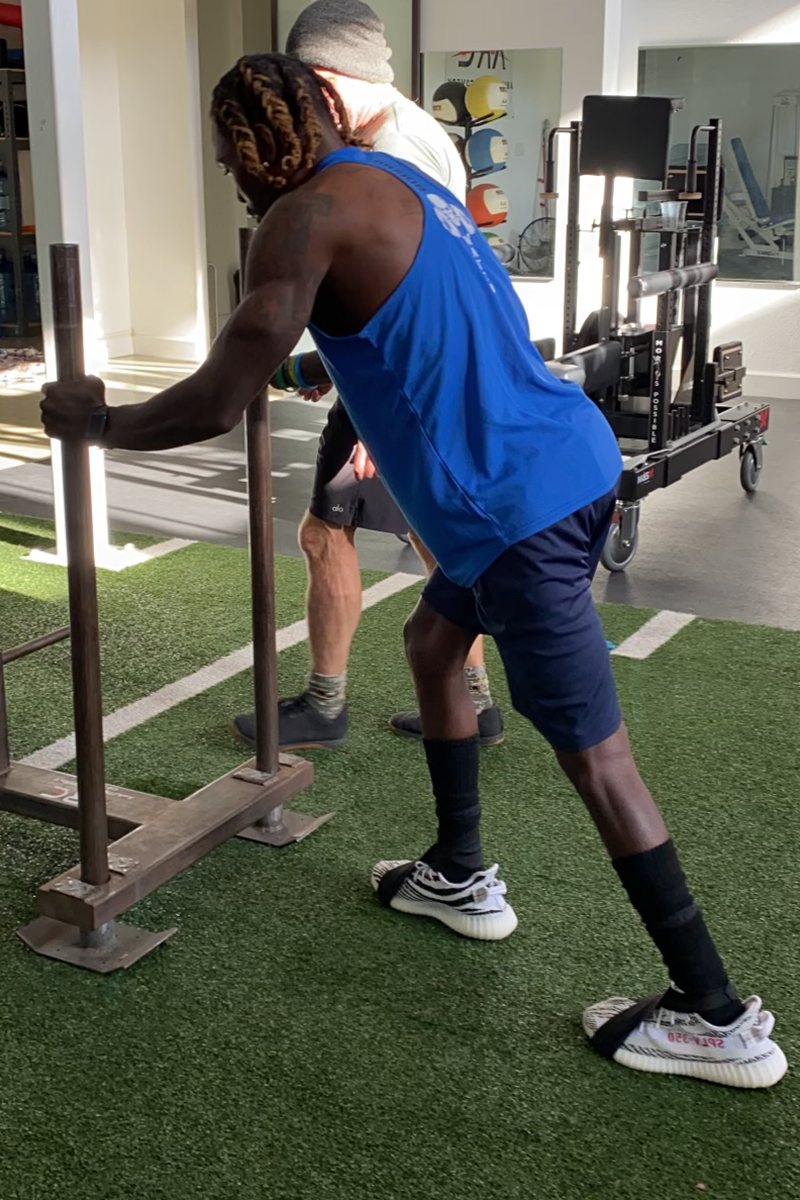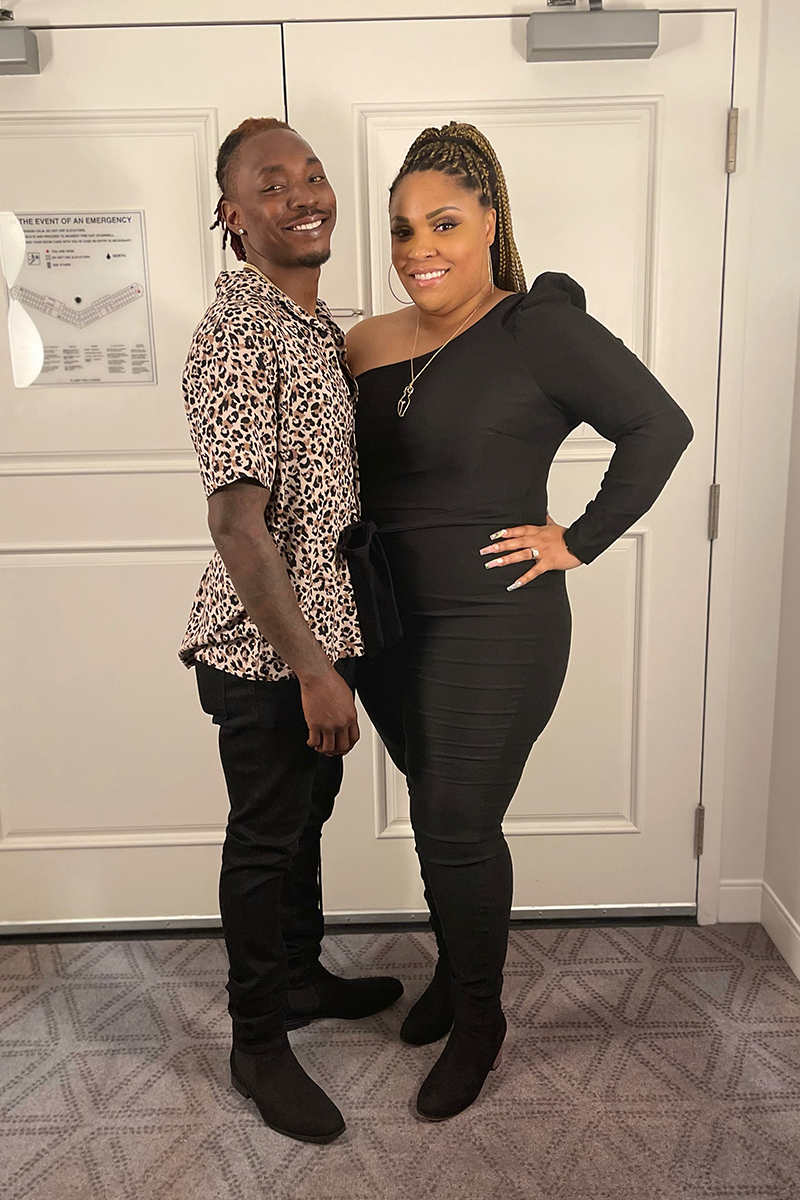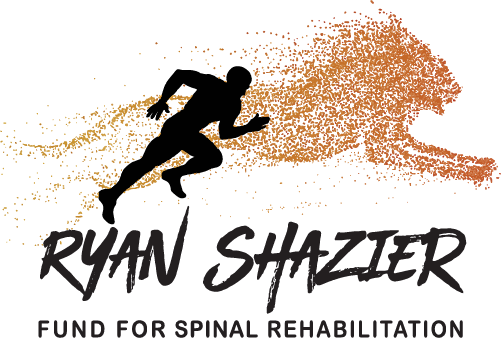Nearly a year after his SCI car accident, Allen Daniels sees his misfortune as a way to inspire and educate other drivers.
Allen Daniels wheels into the interview with the poise and confidence of a man who knows where he’s been and knows where he’s going. Daniels, 32 years young, had a promising football career. “I played arena football for a few years after college,” he says. His professional career spanned four seasons, ending in 2017 with the Albuquerque Duke City Gladiators of the defunct Arena Football League. After football, Daniels worked as a field estimator for a utility company and also ran a side business customizing vehicles. “With (his football and career) work ethic in my toolbox,” he recalls, “I was also passing that (work ethic) to my children.” (Daniels is also busy raising three active stepchildren: two boys, ages nine and 12, and a daughter, 11, with his fiancé.) Little did Daniels know that he would have to summon that same work ethic–tenfold–for himself.
A Blessed Day; A Fateful Night
On April 11, 2021, Daniels and his fiancé were baptized together. Three weeks later, on May 1, 2021, their world would irrevocably change. Daniels, who says, “We all make mistakes, and sometimes we fall short,” admits to getting behind the wheel of his Hyundai Elantra after having a few drinks. “Yeah, I was drinking, and I should have let my fiancé drive,” he says. “But being a man, I let my ego take over.” He and his fiancé had some words about him driving, but Daniels dropped her off to retrieve her car. “Once I dropped her, I sped off, and that’s the last thing I remember,” he relates. Daniels dozed off. He headed off a little cliff and over a dirt mound. He flipped his vehicle several times and landed atop a guardrail.
Several Breaks; Dark Days
“I was pronounced ‘dead at the scene,’” by the local police before the EMTs arrived, says Daniels. Daniels’ spinal injuries included fractured L2-L3 vertebrae with an L1-T12 fusion and fractured C3, C5, and C6 cervical fractures. He has spinal cord damage at each level and is now quadriplegic, incomplete. “Luckily, I had my seatbelt on, or it could have been much worse.” Daniel’s hospitalization and inpatient rehab were “definitely depressing,” he now says. He was in Kern Medical for ten days and then at Encompass Health’s Bakersfield’s acute rehab for another two weeks. At Encompass, Daniels says he was learning “how to put on my socks, how to brush my teeth–all the ADLs (activities of daily living), yeah, those were some of my darkest days.” He was uncomfortable, didn’t like the food, and couldn’t sleep. “I was in so much pain–I had much time to think, and that was rough for me.” His physical challenges are below the waist. “I was given a 22% chance of ever walking again,” he says. However, at his first-anniversary date, Daniels is already exceeding expectations.
Faith and Family
Daniels attends Terrio Physical Therapy twice a week and supplements that with his gym, pool, and Pilates routines. Gearing up for hard PT workouts was second nature for Daniels. “The hardest part for me was being out in public—having to see people, explain my story, and getting over my ego of sitting (in my wheelchair) while everyone else is standing.” Daniels credits his lady for offering the best advice. “Without her in my corner, things would be a lot harder,” he smiles. “She would say, ‘Whether you walk again or not, you have to get some sense of normalcy,’” recounts Daniels. “She’s right. I’m still me; I’m just not able to walk!” Daniels says he had a sound support system—his fiancé, kids, and both sets of parents. “But I also learned that I had friends that didn’t come around—people I thought were in my corner, but I learned were not,” he muses. “That was also hard to accept.” Yet Daniels was still grateful to be alive. “Before, I took a lot of little things, like moving my legs, wiggling my toes, for granted.” “And my faith is a lot deeper too. If it weren’t for God, I wouldn’t be here,” says Daniels. He’s figuring out his purpose next and says he believes he knows that direction.
Motivation to Motivate
Daniels feels strongly about sharing his story. “We are not always invincible. We are not always right. And your plan may not always be God’s plan,” he says. “That happened to be one of the worst days of my life, but now I look at it as a blessing in disguise because I look at life differently now.” “With my story,” he says, ‘I’d start with ‘You should never drink and drive.’” He sees his survival from the accident as a calling to share this message with young people, both new drivers and young adults like himself, that may not fully grasp the ramifications of drinking and driving. Even after the near-fatal crash, Daniels was charged with a DUI. And he has no bitterness toward that. “Oh, I deserved that! And I had never been in trouble before!”
More Downside
“The biggest negative is that I can’t walk! I was taking my frustration out on my lady,” he says. Daniels became angrier and didn’t like whom he was becoming. “But ultimately, I couldn’t blame anyone but myself,” he says thoughtfully, “because I could have prevented that from happening that night.” Daniels wants to have a child of his own and fears that this might not happen due to his lower-body paralysis this might not happen. “But now the sensation is starting to come back, now those things are starting to get better, and I’m trying to wait it out,” he smiles. Plus, his research points him toward male reproductive strategies for SCI warriors. (The Miami Project has an excellent downloadable resource). Despite Daniels’ strong faith in God, he admits his injury had him sometimes questioning that faith in his darkest days. “I asked ‘Why me?’ a few times,” he admits. “But now I see it as ‘God doesn’t put you through anything you can’t handle.’”
Make Modalities for SCI Aftercare More Universal
And Daniels, like most able-bodied people who acquire an SCI, is now acutely aware of what services and goods are lacking for the disability community. He is looking forward to learning more about what is needed and finding a way to amplify those needs to whoever is best suited to help. “We’re not asking for a handout!” Daniels says, “But things that should be done.” Daniels cites assistance with job placement as a critical need for the disabled community. Another need is more affordable outpatient facilities that offer specialized training, such as access to Exoskeleton training. “Those should be in every city.” “And (I think) there should be more spinal cord injury awareness out there. Just like they have all these commercials for Viagra, well….” He chuckles. When told, even he was unaware that September is Spinal Cord Injury Awareness Month. “See? I had no idea!” “One thing I value most now is time. I want to spend time with whomever I can spend time with.” Anyone who is blessed to spend time with Allen Daniels will find it time well spent. And if that time is spent in front of a group gathered to hear his story, to learn lessons from Daniels’ “Lessons Learned,” then his words will have quite a meaningful ripple effect.
More Drunk Drivers Than Arrests
According to Mothers Against Drunk Drivers, people drive drunk more than 300,000 times each day. Only about 1% of those drivers are arrested. That means there are 297,000 impaired drivers on the road every day in the US.
-Source: Mothers Against Drunk Drivers
Shalieve
Wisdom
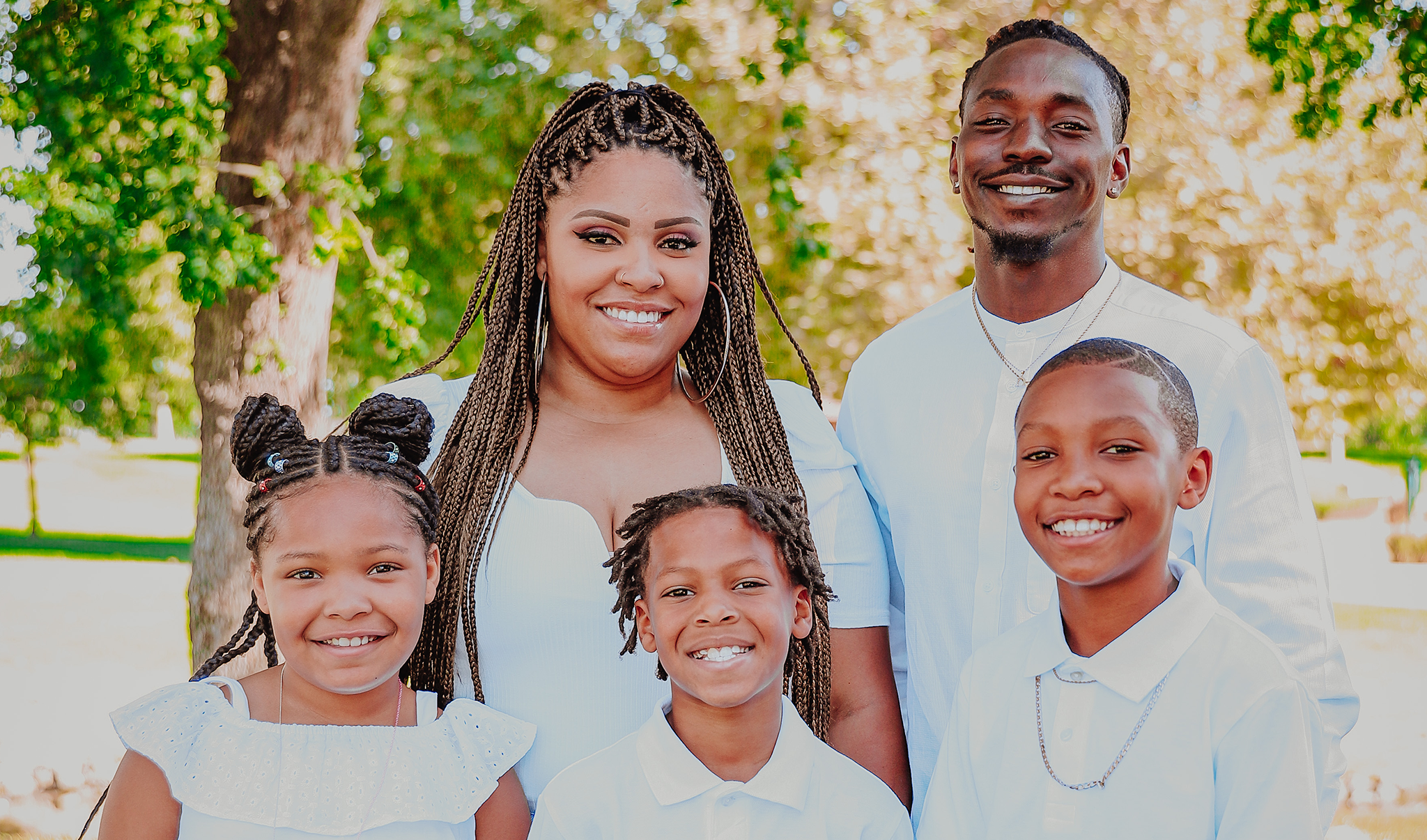
Allen Daniels’ Shalieve Wisdom
Keep your Faith. “You can’t get through anything alone, and God has the ultimate say-so. He will never forsake you, and I know He is always in my corner.”
Be determined and motivated. “You have to be willing to sacrifice things—like playing video games or going out like you used to—to focus on your recovery. You have to recover properly by eating right, getting enough sleep, and putting quality time into your workouts.”
Be an inspiration to others. “Everybody’s situation is different, but somebody’s always going through something worse than you. If you stay positive, then your example may give someone else inspiration, who may need that spark.”

